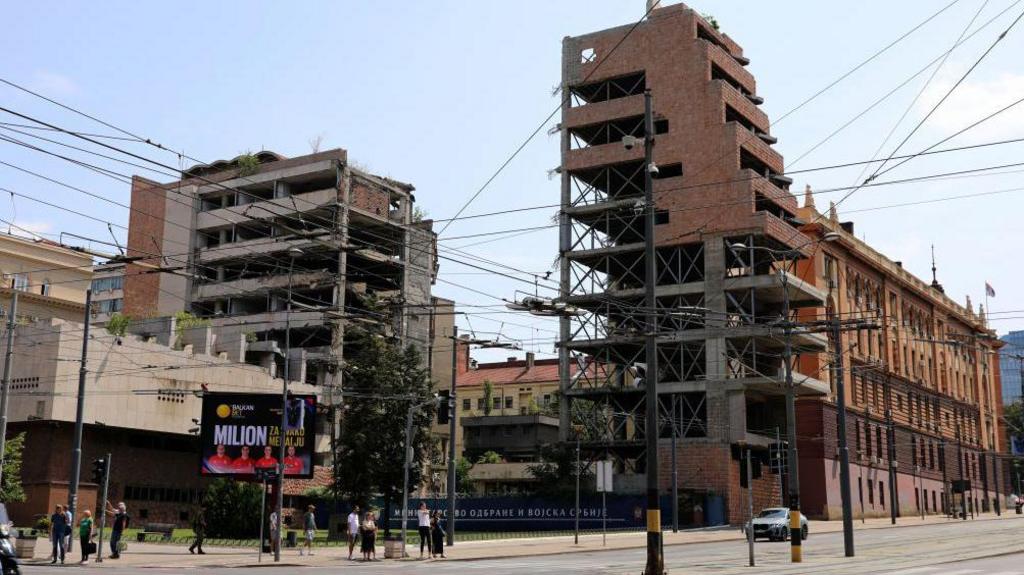Visitors to Belgrade are immediately confronted by a stark reminder of Serbia’s past: the bombed-out remains of government buildings, casualties of the 1999 NATO intervention. These structures, standing as a testament to a tumultuous history, convey a potent message of unresolved conflict.
The damaged Defence Ministry buildings, resembling a smile marred by missing teeth, bear the scars of NATO’s actions aimed at halting Serbia’s military campaign in Kosovo. The United States, as a key NATO member, played a significant role in the bombing.
Therefore, the Serbian government’s 2023 decision to partner with Affinity Global, an American company founded by Jared Kushner, to redevelop the site into a $500 million (£370 million) complex—dubbed “Trump Tower Belgrade”—proved jarring to many.
This wasn’t entirely unexpected; Donald Trump himself had previously expressed interest in a hotel on the site. The deal also aligns with accusations by the Serbian opposition that the government favors foreign investors over public interests.
This pattern is exemplified by the Belgrade Waterfront project, a development by Emirati firms on land previously owned by Serbian Railways. While this created a modern shopping center and the Belgrade Tower, it replaced a derelict area and is not universally lauded.
However, the Defence Ministry site is different. Its symbolic significance as a memorial to the 1999 bombing and a powerful reminder of anti-NATO sentiment and pro-Russia sympathy within Serbia makes granting a 99-year lease to a US developer, reportedly without upfront costs, a highly controversial move.
President Aleksandar Vučić defends the decision, stating to the BBC that improving US relations is crucial. This perspective resonates with Belgrade’s international business community, although Serbia’s GDP per capita remains significantly below the EU average.
Attracting investment is vital for economic growth. While financial details remain undisclosed, the New York Times reported the Serbian government will receive 22% of future profits. James Thornley, a financial consultant in Belgrade, argues that such large-scale international projects enhance Serbia’s profile, attracting further investment.
However, not all are convinced. Andrew Peirson, a real estate executive, while acknowledging the positive investment implications, criticizes the lack of a transparent tendering process, suggesting a deviation from standard practice in developed markets. He points out that a competitive bidding process would have ensured fair market value for the site.
Further complicating matters, the deal’s approval involved a now-arrested official accused of fabricating documents to justify lifting the building’s protected status. This fuels suspicions of preferential treatment for Affinity Global, which denies any wrongdoing. The Serbian government also rejects these claims.
The project’s future remains uncertain. While Affinity Global insists on reviewing the matter, the arrested official’s actions raise significant concerns about the deal’s legality and transparency. The site’s historical significance also adds another layer of complexity, with critics arguing against demolishing a culturally important landmark. The site’s ultimate fate remains uncertain, but its troubled history will likely continue to be a focal point for years to come.
The 131cm-high figurine was sold at the Yongle International Auction in Beijing.
The world’s two biggest economies have agreed in principle a framework for de-escalating trade tensions.
The Hollywood studios allege Midjourney’s image generator is a “bottomless pit of plagiarism”.
Asian bakeries are seeing success at home and abroad by bringing global flavours to traditional French pastries.
Jetstar Asia has struggled with rising supplier costs, high airport fees and increased competition.

